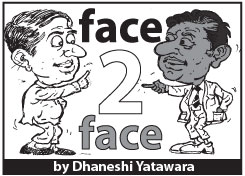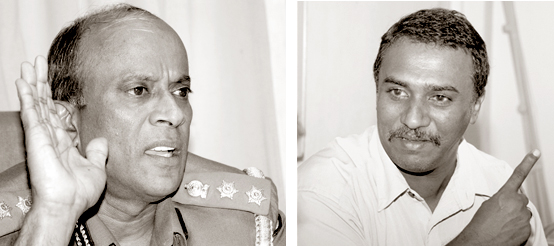For a safe and secure travel ...
By Dhaneshi Yatawara
[email protected]
 Throughout
history we know, terrorists treat civilian deaths as a victory. Though
it sounds barbaric to the civilized societies it is the nature of the
terrorists. It is of utmost importance to safeguard ourselves and above
all, to eliminate terrorism that disrupt and destroy our lives! Throughout
history we know, terrorists treat civilian deaths as a victory. Though
it sounds barbaric to the civilized societies it is the nature of the
terrorists. It is of utmost importance to safeguard ourselves and above
all, to eliminate terrorism that disrupt and destroy our lives!
Public transportation is now under a severe threat islandwide. How do
you assess this situation?
SSP Ranjith Gunasekara - Police Media Spokesman
I see this as a method used by the LTTE to uplift the morale of their
cadres. Since they are losing their sinister moves in the battlefront
the LTTE need to show their prowess. This is their vicious plan to take
innocent citizens as their ‘enemies’. Trying to create a conflict
between the Sinhala and Tamil communities seems to be another notion of
theirs.
Gemunu Wijerathne - President, Lanka Private Bus Owners
Association
|
 |
|
SSP Ranjith Gunasekara - Police Media
Spokesman |
Gemunu Wijerathne - President, Lanka
Private Bus Owners Association Pix by: Kavindra Perera |
Yes, we can see a level of insecurity. But I am happy that the
private bus sector is not that much threatened, comparatively. If we
consider the past bomb explosions, the majority of the buses were Sri
Lanka Transport Board buses and not private buses.
On our part we are always highly vigilant and all the time we
strongly emphasize the bus owners and conductors should keep their eyes
open! And of course they do it with a sense of commitment.
Anyway, unlike in the past at present a number of such incidents have
gone down. May be, because we are extra cautious on security. Of course,
the Government and the Police were immensely supporting us to carry on
that extra mile.
What are the measures that must be taken to ensure the safety of
the public transportation?
RG:
With the measures taken so far the people and the bus operators were
vigilant enough in detecting many explosive devices, especially if you
take the incidents for the past few weeks. And it is important to keep
on reminding the people! I have observed that people tend to forget this
message when they are rushing to the office and while returning home.
True, commitments are there. But safety cannot be forgotten.
So, vigilance of the public is highly important if we need to curb
this terror threat on public transport.We should not let the LTTE to use
human weaknesses to operate their ‘modus operandi’.
GW:
Most importantly we must realize the gravity of the terrorist
threats. Their targets are pre-determined and irrespective of political
hues they will execute their plans. So the reality is we have to face
this problem all the time.
The major part of the public transport in the country is handled
by the private bus operators. It is constantly being complained of poor
services. Do you think these shortcomings lead to the collapse of the
safety of public transportation?
RG:
I do not think it is a serious security threat but I do not deny as
well. Buses getting over-crowded will not be a serious issue if the
people and the bus operators are vigilant enough.
If we take serious note of the recent incidents we have seen that
placing bombs in buses is more difficult than in railway compartments
because the driver and the conductor plays a bigger role in ensuring
security in buses.
If people also extend their cooperation by identifying and letting
their parcels and baggage to be checked when necessary, a terrorist
carrying explosives or bombs would be reluctant to get in. That minute
action of passengers could have saved hundreds of lives.
GW:
President Mahinda Rajapaksa himself telephoned me and told me the
same. In fact on his request we submitted several suggestions two months
ago.
We recommended changing the peak hours by changing the in and off
times of the public and the private sectors - making enough time for one
group to be away heading home, when the other group gets off for the
day.
Unfortunately it ended up as a mere suggestion only! The President
accepted and it is on the side of the Ministry of Transport to assign
time for a meeting to discuss the issue. We strongly believe had it been
implemented it would have saved many lives.
How do you expect the bus operators to act with regard to the
safety of the passengers?
RG:
First I must give my compliments to most of the drivers and
conductors who play a greater role in safe guarding lives of passengers.
On the other hand, I have seen some operators are not vigilant enough.
Before take in passengers they must check and search the buses firstly
and request the passengers to show their parcels, baggages and to keep
their belongings with them is a must.
GW:
We expect them to be very vigilant all the time. And they give
immense support. But now it is too much of responsibility on them.
Conductors and drivers face problems when they try to check the huge
baggage some people would carry with them.
Some people are very reluctant to help. So at times even the
conductors are in trouble. Sometimes the issue becomes so serious that
the driver and the conductor has to seek Police help. At times there are
practical difficulties.
What are the steps you initiate to create awareness among the bus
drivers’ and conductors’?
RG:
According to a concept of IGP Victor Perera, every Police station has
set up a security committee which comprises bus operators, traders and
many members of the civil society in addition to Police Officers
themselves.
Through these committees we have given enough instructions. This
happened throughout the island. A shortcoming I see is the lack of
knowledge in detecting explosives.
GW:
Recently we carried out a campaign in association with the Ministry
of Transport making the drivers, conductors and passengers aware of the
current situation.
We have conducted awareness programs initiated by the Police to
educate drivers and conductors. We have pasted stickers in the buses
advising the people to be vigilant. At every major bus-stop, a Police
post is set up to check buses and passengers.
What sort of cooperation you expect from the passengers?
RG:
We need the sharp vigilance of the passengers. Public security will
not be 100% successful if public cooperation is not received. This is a
basic theory lying under successful public security measures because
detection is the most important and the difficult part in averting
disasters. At the moment we do have public vigilance to a certain level
but it is not satisfactory.
As citizens it is their responsibility to be vigilant about their
surroundings. And they have to be mindful of their responsibility.
GW:
Vigilance of the passengers is a must. We would be grateful if they
can keep an eye on their surroundings while travelling. The moment they
detect something suspicious they should inform the driver and the
conductor and move out from the bus. That is not the problem.
The problem is safeguarding the lives of people. That is more
important. On the other hand, now we see that if a person opposes
checking his luggage all the other passengers support the driver and the
conductor. And, almost all the passengers except for a very few, extend
their fullest support. It is a great achievement.
Do you think the threat on public transport could be stopped with
adequate measures?
RG:
This is a vast subject. Providing 100% security to the travelling
public society is not practical. This is accepted throughout the world.
Even if we use highly professional methods in providing security we can
assure only 99.9% safety intact. This is the practical situation of
security extended at any level, at any place.
GW:
It is not practical. This cannot be fully stopped. We can only
minimize. The size of a bomb can be of a cake of soap. In a crowded bus
it can easily go undetected. That is the difficulty of this situation.
But we can greatly minimize the damage simply by being vigilant.
Are there any modern techniques on the card to enhance the safety
of the public transportation?
RG:
What is necessary in assuring public security is implemented
throughout the country. Setting up security committees, vigilant
committees and different civil societies to get the utmost public
support is already on process. The only lapse we see is the lack of
vigilance on the part of the public.
In addition, we have requested the media, specially the radio
channels which we hear aloud in many buses, to give a small reminder to
the public during their programs. A mere fifteen seconds reminder would
do! It would help to bring back the responsible passenger we want to
see.
GW:
Well as per our capabilities the process seems to be adequate.
Vigilance on the part of the passengers is at a very satisfactory level
and is improving. In my view, we can take adequate measures to minimize
the threat to a greater extent.
|
